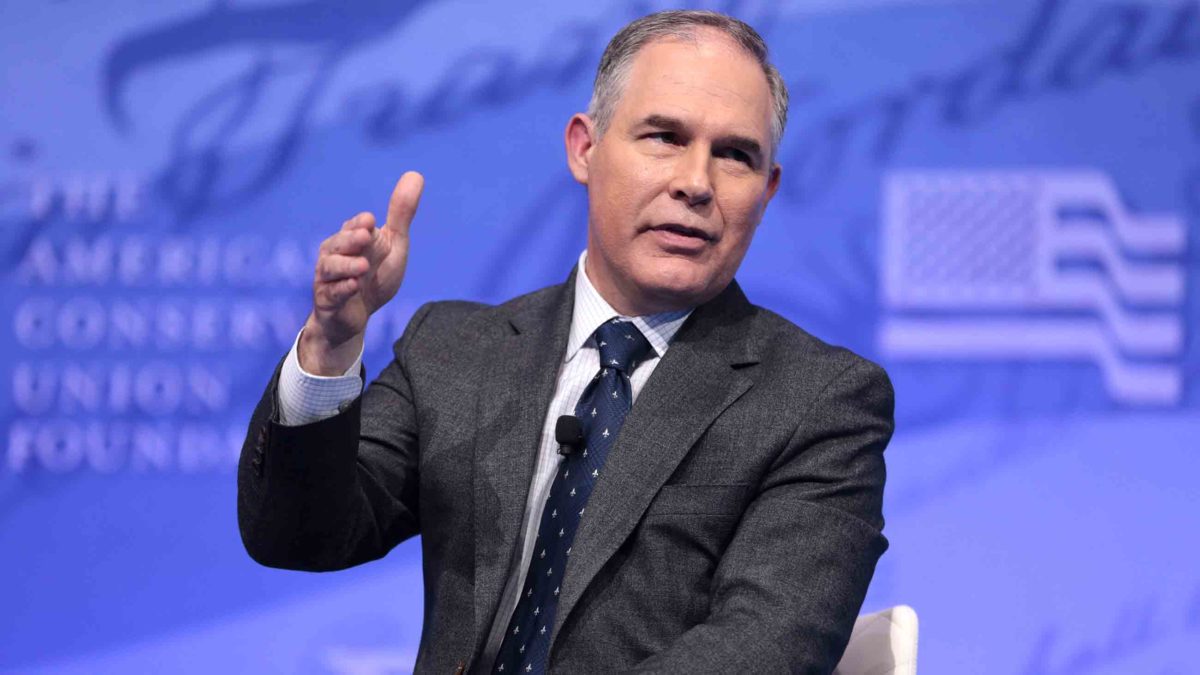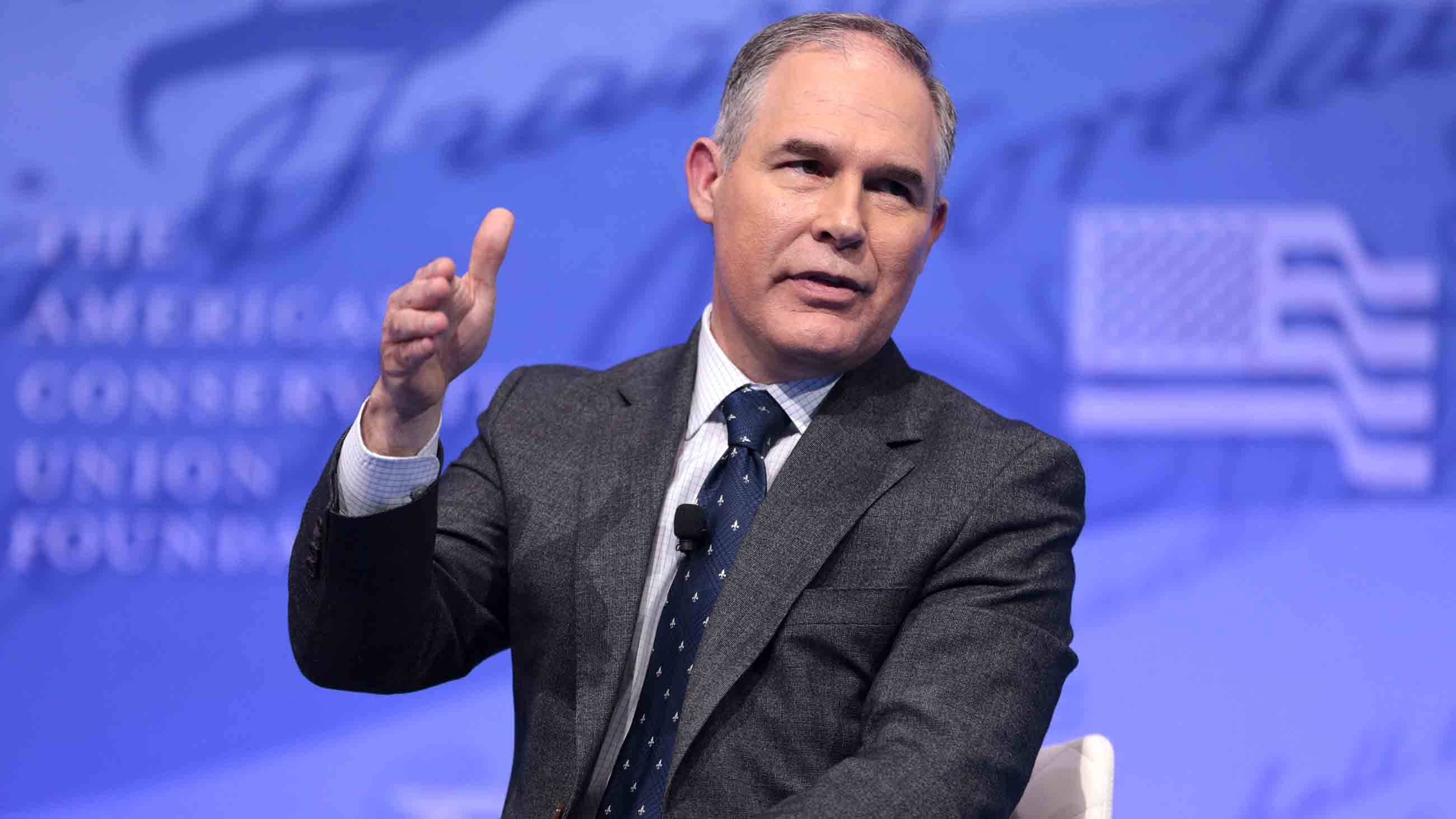Debate over government regulations — or rather their steady disappearance under the Trump administration — continued this week, with news that the Environmental Protection Agency has been easing the process it uses to determine the safety of new chemicals.

EPA administrator Scott Pruitt continues to come under fire for his ties to industry.
Visual: Gage Skidmore/Flickr
Among the changes in what has been lambasted by critics as an industry-friendly move, the EPA will no longer require companies that want to produce new potentially hazardous chemicals to sign an agreement limiting their use. The agency has said such agreements can be required at its discretion and that existing “significant new-use” restrictions will continue to provide protections.
Following the rollback trend, last month the EPA announced intentions to revise the minimum age requirements for farm workers applying pesticides. Though the agriculture industry is generally exempt from the federal minimum hiring age of 16, a 2015 law tightened rules regarding the handling of pesticides — which can cause long-term damage to the brain and reproductive system — to protect minors, including migrants with limited English skills.
Critics of the Trump administration cite his EPA administrator’s ties with industry as prompting many of these changes. Just last month, the agency’s head, Scott Pruitt, had been in talks with automaker Toyota regarding plans to have the company review some of the EPA’s internal practices. Toyota announced that it was ending the discussion Wednesday after harsh reactions and pressure from environmentalists.
In an interview with CBS on Wednesday, Pruitt defended his ongoing regulatory discussions with industry stakeholders, saying many past regulations have been confusing and don’t further the EPA’s mission of “advancing protection of the environment.”
Also in the news:
• The number of yearly deaths in the United States caused by drunk driving is now close to 10,000, a loss rate that the National Academies of Science, Engineering, and Medicine calls “entirely preventable.” In a report released Wednesday, a panel of researchers issued a number of strong recommendations to reduce such deaths, including dropping the legal blood alcohol concentration limit for drivers from .08 to .05. The state of Utah has passed a law setting that level that will go into effect at the end of this year — and some 100 other countries have already done the same. The National Transportation and Safety Administration will now consider the recommendations, which are drawing immediate and fierce opposition from the alcoholic beverage industry. (Associated Press)
• In what appeared to be a nod to some of Venezuela’s most vulnerable citizens, President Nicolas Maduro announced on Monday that pregnant women would receive an additional 70,000 bolivars a month in assistance from the government. The problem? With the country’s collapsing economy, that amounts to just $3.83. And as people around the country continue to face shortages of food, medicine, and other basic necessities, it’s unlikely that much of what they need will be available for purchase. (CNN Money)
• On Tuesday, the European Parliament voted to ban what’s known as pulse trawling, in which short electric bursts are used to rouse flatfish hiding in sediment and into nets where they can be hauled onboard ships. The move came as a surprise to Dutch fishermen, who have embraced the technique, arguing that it’s more sustainable and better for the environment than traditional bottom trawling. With that method, a net with iron chains is dragged along the sea floor, resulting in unnecessary casualties for many non-target species, and greater disruption of the seafloor ecosystem. BLOOM Association, a Paris-based environmental group, pushed for the ban, arguing that pulse trawling also harms other marine life, though scientists haven’t yet found much evidence to support that claim. (Science)
• A new kind of climate observatory, being developed for launch in the early 2020s, will hitch a ride on a communications satellite to monitor greenhouse gases over North and South America. Unlike other satellite-based instruments, which circle the earth, this one — called GeoCarb, for Geostationary Carbon Cycle Observatory — will travel at the same speed as earth’s rotation, allowing it to keep a continuous eye on one large swath of the planet. The goal is to answer questions like how much carbon dioxide the Amazon forests remove from the atmosphere, and how much methane is being emitted from energy production in the United States. And GeoCarb will be less expensive than traditional orbiting climate missions, principal investigator Berrien Moore of the University of Oklahoma told NASA. “You don’t have to pay for a separate spacecraft or launcher. You’re essentially buying condo space on a spacecraft.” (E&E News)
• In an effort to curb America’s opioid crisis, retail giant Walmart announced that it will begin distributing DisposeRx, a packet containing ingredients that, when mixed with warm water, will help customers turn leftover pills into a biodegradable gel that’s safe to throw away. Patients will also receive opioid safety information along with their prescription. While acknowledging the scale of the country’s problem,
Marybeth Hays, executive vice president of Consumables and Health and Wellness at Walmart U.S., said in a press release that the company is “confident this unique, easy-to-use disposal solution … will make a meaningful impact on the lives of many.” (Associated Press)
• And finally: In response to increasing prices and shortages of generic drugs, four major hospital groups have joined forces to manufacture their own. Through a new not-for-profit company, Intermountain Healthcare, Ascension, SSM Health, and Trinity Health — which together run 300 of the nation’s hospitals — plan to begin making or subcontracting out production of select generic medications by 2019. Though the hospital groups have not disclosed the specific drugs they plan to focus on, they say their aim is to combat situations in which companies are “cornering the market and creating shortages.” For many, the most evident case is that of Martin Shkreli, whose company in 2015 raised the price of HIV and malaria drug Daraprim from $13.50 to $700 a pill. (STAT)










